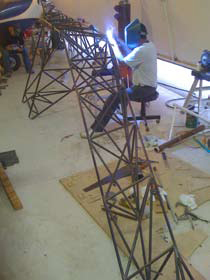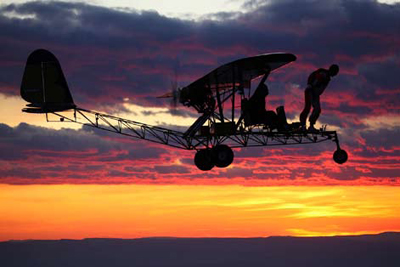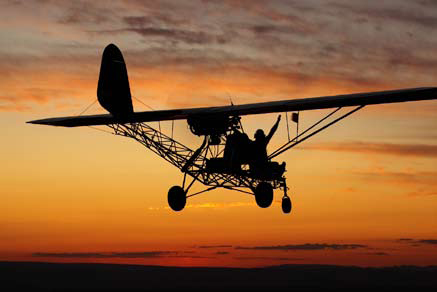Joe Dorys Breezy By David Gustafson
| The Breezy looks like an airplane that had a happy encounter with a radio tower. After 45 years, it’s still one of those “Oh-my-gosh” airplanes that inspire awe, giggles and the desire to go flying…all at once. Indeed, Carl Unger has taken thousands of smiling attendees up for the flight of a lifetime since he first arrived at the EAA Fly-In in Rockford, back in 1965 perched on the front end of his Breezy. The aircraft was actually built by Carl and two other EAA members, Charley Roloff and Bob Liposky, as a lark. They started construction in 1964 after building a wire model. They didn’t know how much steel tubing they were going to use, so they ordered small batches at a time. A friend gave them a set of Piper PA-12 wings, they bought a new C-90 engine for $1,700, a radio for $800, and the total cost for the airframe was $1,000. Unger donated the prototype Breezy to the EAA Museum in 1990. He and his friends never expected anyone to take a serious interest in their project, but Carl wound up selling over 1,000 sets of plans.
One of those sets went to Joe Dory. He got Breezy fever the first time he laid eyes on the design. That happened in 1995 when a gentleman named Breezy Bob stopped at Caldwell, Idaho during his tour to promote cancer awareness. Joe stored Bob’s Breezy in his hangar that night and went for a transformative flight the following day. He was soon looking for a Breezy of his own and picked up a project within two weeks. Turned out the fuselage was junk and the wings had to be rebuilt. Being an IA and A&P, Joe wasn’t lacking for talents in homebuilding. He ordered a set of plans from Carl and used his contacts at the Kitfox factory to order tubing for a new fuselage. Thirteen years went by. Then, with help from Jim Raeder, who had done a lot of welding at Avid Aircraft, they built up the required jigs, cut and tack welded the tubes together and assembled the complete fuselage structure. Joe related that putting the parts of the fuselage together without warping the structure was a challenge.
The J-3 wings required recovering and Joe’s wife, Red, got involved in that Being somewhat of an obsessive-compulsive individual, Joe worked nearly every weeknight and weekend for a year. He made one phone call to Carl for help: it had to do with rigging the aircraft. Joe wound up departing from the plans by increasing the wing and tail incidence. He also added electric trim for the elevator, added nose gear suspension and then gave it the final touch by wiring the aircraft for an electric vest that extends his flying season in Idaho by several months pre- and postsummer. Carl’s Breezy has a small console between the
Joe considers the Breezy a perfect retirement toy. It’s not designed for cross
Joe put his Breezy on the market recently so he could pursue his new passion for helicopters.
(Note: the air to air photos were taken by Jim Raeder) |

 Aircraft Spruce Australia
Aircraft Spruce Australia


 part of it…after he installed new aileron cables to accommodate the new fuselage. He also tore into the O-290, 125hp Lycoming and overhauled it. When he asked Red what color he should paint it, she pointed to a Dodge Charger on a website and indicated she liked the green color of the car. Joe’s fuselage was painted a very bright green.
part of it…after he installed new aileron cables to accommodate the new fuselage. He also tore into the O-290, 125hp Lycoming and overhauled it. When he asked Red what color he should paint it, she pointed to a Dodge Charger on a website and indicated she liked the green color of the car. Joe’s fuselage was painted a very bright green. foot
pedals to accommodate instruments. Joe wanted an unobstructed view, so he mounted his instruments behind the passenger seat. After a DAR from Sand Point, Idaho flew down and gave the project his blessings, Joe had a ready-to-fly Breezy on the ramp. He was very excited about the flight. There is a lot of welding on a Breezy.
Welding without warping is a challenge on this structure. Joe’s wife, Red, likes green.
foot
pedals to accommodate instruments. Joe wanted an unobstructed view, so he mounted his instruments behind the passenger seat. After a DAR from Sand Point, Idaho flew down and gave the project his blessings, Joe had a ready-to-fly Breezy on the ramp. He was very excited about the flight. There is a lot of welding on a Breezy.
Welding without warping is a challenge on this structure. Joe’s wife, Red, likes green. Joe collects pilot ratings and holds commercial, IFR, CFI and Helio ratings. When a friend of his bought a Breezy in 2007 and wanted some instruction, Joe offered to check him out in exchange for some flying time. He logged about 20 hours. He’d also flown some high performance aircraft, so the Breezy didn’t intimidate him.
“I knew it would fly. The question was, how well would it fly?” It exceeded his expectations. He admits that the “high thrust line takes a little getting used to and it has some quirky takeoff characteristics. You have to get it up to 50 mph before rotating. It flies different, but not in a hostile way.”
Joe collects pilot ratings and holds commercial, IFR, CFI and Helio ratings. When a friend of his bought a Breezy in 2007 and wanted some instruction, Joe offered to check him out in exchange for some flying time. He logged about 20 hours. He’d also flown some high performance aircraft, so the Breezy didn’t intimidate him.
“I knew it would fly. The question was, how well would it fly?” It exceeded his expectations. He admits that the “high thrust line takes a little getting used to and it has some quirky takeoff characteristics. You have to get it up to 50 mph before rotating. It flies different, but not in a hostile way.”  country or aerobatics, but it’s a delightful experience when you just want to
country or aerobatics, but it’s a delightful experience when you just want to
